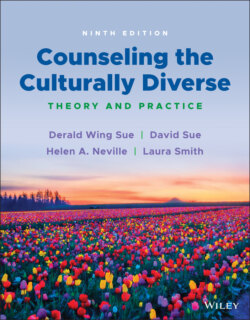Читать книгу Counseling the Culturally Diverse - Laura Smith L. - Страница 48
THE HARM OF CULTURAL INSENSITIVITY
ОглавлениеAlthough there are disagreements over the definition of cultural competence (Mollen & Ridley, 2021), many of us know cultural insensitivity when we see it; we recognize it by its horrendous outcomes or by the human toll it takes on our marginalized clients. For some time now, multicultural specialists have described Western‐trained counseling/mental health professionals in very unflattering terms: (a) they are insensitive to the needs of their culturally diverse clients; do not accept, respect, and understand cultural differences; are arrogant and contemptuous; and have little understanding of their prejudices (Ridley, 2005); (b) clients of color, women across race and ethnicity, and lesbian, gay, bisexual, transgender, and queer (LGBTQ) individuals frequently complain that they experience microaggressions in counseling (Hook et al., 2016; Owen, Tao, & Drinane, 2019); (c) discriminatory practices in mental health delivery systems are deeply embedded in the ways in which the services are organized and in how they are delivered to minority populations, and are reflected in biased diagnoses and treatment, in indicators of dangerousness, and in the type of people occupying decision‐making roles (Desai et al., 2021); and (d) mental health professionals continue to be trained in programs in which the issues of ethnicity, gender, and sexual orientation are ignored, regarded as deficiencies, portrayed in stereotypic ways, or included as an afterthought (Ponterotto et al., 2006; Ratts & Pedersen, 2014).
